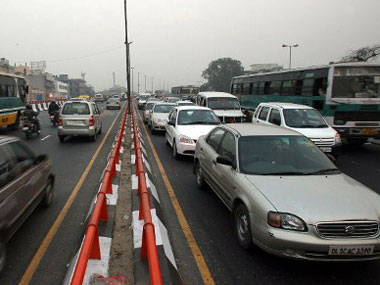By R Jagannathan
The clamour for higher taxes on diesel cars and SUVs looks likely to gather momentum. While the Supreme Court is looking at a public interest litigation seeking to levy a higher tax on polluting diesel vehicles, the finance ministry may be considering such a tax on diesel vehicles for reasons relating to subsidies.
When policies are created to meet narrow short-term ends -like a budget deficit, or a winter pollution problem in Delhi -we are going to get lopsided results. The current customer preference for diesel cars is the result of precisely such a flawed policy from the past-of trying to keep diesel prices far below petrol for nearly a decade or more for specious reasons.
[caption id=“attachment_539713” align=“alignleft” width=“380”]  We have a pollution problem, both because diesel is subsidised and because emission norms are not tight enough.Reuters[/caption]
If we are not to get into yet another problem a few more years down the line, policy has to be evolved in a holistic fashion keeping many objectives in mind.
Consider the challenges.
We have a budget deficit problem because we subsidise diesel heavily (Rs 1,00,000 crore this year on diesel alone).
We have a pollution problem, both because diesel is subsidised and because emission norms are not tight enough.
We have urban road congestion caused by underinvestment in public transport and overinvestment in private vehicles, both four- and two-wheelers.
We need an automobile policy that is technology neutral, and does not artificially favour any sector-whether two-wheelers or four.
If we have to take all these issues into account, our automobile taxation policy cannot be legislated in isolation by levying a diesel vehicle tax here or a parking fee there. We need an integrated policy.
Impact Shorts
More ShortsAnd what could this integrated policy be when we have multiple objective? If the idea is to improve urban transport, reduce pollution, and reduce subsidies, the policy could be built on the following lines.
First, the gap between petrol and diesel prices must be reduced. This will automatically end the “so-called” diesel subsidy for SUV owners.
Second, automobile taxation must be raised in stages. This can be done by either taxing vehicles by age - older vehicles more and new ones less-or by levels of pollutants emitted. Smaller cars with lower pollution would thus be taxed less than larger ones, or more polluting ones. Of course, we must have higher base emission standards for all classes of vehicles, and not just four-wheelers.
Two-wheelers are not exactly benign players in the pollution crisis, but they go under the radar-despite being sold in millions-because they are thought to be aam aadmi vehicles. It’s time the aam aadmi also learnt a bit about reducing pollution.
Third, automobiles must be taxed for usage, and not purchase alone-especially in congested urban areas. Vehicles fitted with radio frequency ID chips can be used to track vehicle mileage and users can be sent quarterly bills for road usage-like we do for electricity or water.
Fourth, the higher taxes earned must be used for subsidising urban transport, including buses-which can alleviate congestion faster than suburban trains or underground metros, which take years to build. Coupled with curbs on use of cars during peak hours, urban congestion and pollution will ease considerably.
While vehicle taxes and pollution laws should be decided centrally, restrictions on private vehicle use during specific hours, charging more for road usage and parking, and other such fees should be levied at the municipal level.
This is what an integrated automobile policy should look like.
And what would happen to the automobile industry if we put such restrictions on its growth? If we mandate compulsory scrapping or older vehicles of all kinds, there should be enough demand in the short run to allow them to adjust their investments to a realistic level.
Ideas like taxing more for diesel vehicles, like the one suggested by economist Kirit Parikh, who wants diesel cars taxed not just once, but annually, at rates varying from Rs 20,000-50,000, will just compound the problem. We will thus be flooded with petrol cars in cities-and not have solved any problem for the long term. Without public transport, demand for cars and two-wheelers can never be moderated.


)

)
)
)
)
)
)
)
)



